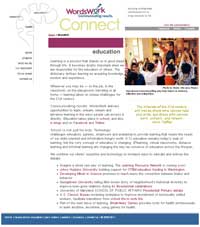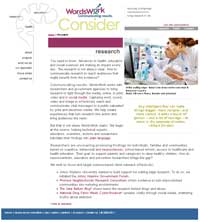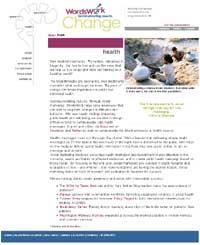Thinking out Loud by Elise du Pont
Lessons 'The Candidate' learns first time out
December 1984 - When I began my race for Congress a year ago, I already had been through three other congressional races and two for governor on let us say a rather personal level. Needless to say, I felt prepared to run the course, to tough out the slings and arrows, to win or lose. In hindsight, I see how little I knew about being “the candidate”.
Some unusual tasks are involved.
First, you must endure the longest, most arduous and most scrutinized job interview one could possibly suffer. Imagine submitting your resume for inspection to an entire state political party before you can even consider the prospect. It really does pay to have the endorsement of a party- in financial, moral and people support. Most candidates have a primary process, where they run just for the privilege of being nominated. The courtship of the party and the people takes time and nurturing, but it pays off. I learned what that support means when Delaware Republican State Party came through with valuable tools, information, volunteers and fundraising, not to mention boosts to my morale and advice of trusted colleagues.
After courting your party, you must take your candidacy to the people. The people of Delaware, I’ve learned, are tough critics. They know what they want from their politicians and aren’t afraid to demand the best. I have enormous respect for the requirements Delawareans place on those they elect: candor, an ethical framework and good sense. They expect you to listen and to respond effectively.
Second, as any veteran campaigner knows, making it through an 18 hour campaign day is about 50 percent good planning and 50 percent good fortune. More often than not, Lady Luck rules how you’ll get through your busy day.
For example, after starting at 7 a.m. in New Castle County, holding three afternoon Home Visits there before we could leave for Rehoboth, and leaving two campaign stops there in a March peasoup fog to head out to Frankford for another Home Visit, we got lost. Not just a little lost, but “running out of gas when the fog is thick and it’s beginning to rain” lost. The only gas station within several miles turned out to be closed. We were sure we were stranded. But, by stroke of good fortune, we happened to have just bought that gas station we’d found closed. Didn’t even know how to turn on the pumps just yet. But we put our good heads together, I filled the tank in the pouring rain and we got on our way, slightly soaked but very grateful. You learn to appreciated the unexpected.
Third, as the campaign becomes more heated and the amount of time to convince voters that you are the better candidate dwindles, it is critical to maintain perspective. Usually, perspective means laughing at your mistakes, putting them under your belt and forging on. Unflagging effort and unbridled optimism are the candidate’s most important tools.
One event comes to mind occurred when both my opponent and I were asked to two debates scheduled at almost the same time. The worst of it was that the first, a television debate, was to take place in Philadelphia; the second, a candidate’s forum in Dover. Naturally, you have to try to do both events, but how? Without consulting the Carper team, we decided to rent a plane and fly to Dover immediately after the taping.
So, as the last questions were being wrapped up, Tom and I went our separate ways, each leading the other to believe we would drive south and try to reach the second event. And, of course, as we pulled up to the airport, there was Tom’s plane ready to taxi out to the runway. As our congressional race escalated literally to the heavens, our plane managed to pull ahead and reach the landing strip ahead of the Carper crew. The race was on.
Ironically, by the time we arrived (I was just ahead of the congressman), we found only some tired campaign volunteers and an empty room. Such is the fate of most political rhetoric. But we shared a hearty laugh and a slap on the back, giving ourselves “A” for effort.
On a more serious side, the fourth caveat in the running for elective office is never to underestimate the power of incumbency. Unless an elected official has made glaring errors while in office, it is difficult for any challenger to beat the advantage of a congressional office, which has staffers who handle correspondence, computer systems, mailing lists, legislative aides and the entire Library of Congress at its disposal. The best bet is to run in an uncontested race. Otherwise, prepare for defeat.
Fifth, keep in mind what you’re trying to accomplish. You’re running in order to serve the public, not to become a star, not to rub elbows with the high and mighty. To serve effectively, you must build a reputation for honesty and fairness. You must be prepared to shift your sights beyond the selling to the serving. And always, to listen, to learn, to lead.
Let these five lessons make you decide that maybe politics is not for you, I point out the rewards. The biggest don’t come from winning; they come from gaining new appreciation for people and renewed trust in our political system. And believe me; you can’t have one without the other.
People, especially people in little Delaware, are really in tune with what they expect and need from their public officials. They demand honesty and integrity, but they also demand loyalty. If you are a politician, even if you’re only a candidate, you are under surveillance. Will you be responsive to people’s needs? Will you be responsible to help them with problems? Will you really listen to what they have on their minds? These are the criteria by which Delawareans judge you.
And that’s why the political system in this country works. Parties evolve. Their philosophies represent a way to find solutions to the problems of people. People look for politicians and the process to help them maintain or improve the quality of life in Delaware, in America.
At every Home Visit, plant gate and church and school throughout the state. I learned a little more; I saw clearly what I was responsible to do as a candidate and participant in the community.
The discovery of people and the process was a much greater reward than winning. I gained insight into what makes our lives tick and grow; that became an important lesson to me.
When I began my race for Congress, I felt I understood my responsibilities as a candidate and a representative. I know now I couldn’t have.
Today, I feel 10 years older and immeasurably wiser. I may have lost the election but I have won so much along the way.
Thinking about running for office someday? The race is long and
hard. The rewards win or lose, are tremendous.
I say, “Go for it!”
Elise du Pont was the Republican candidate for U.S. House in 1984. From 1981 to 1984 she was an assistant administrator. Agency for International Development.






